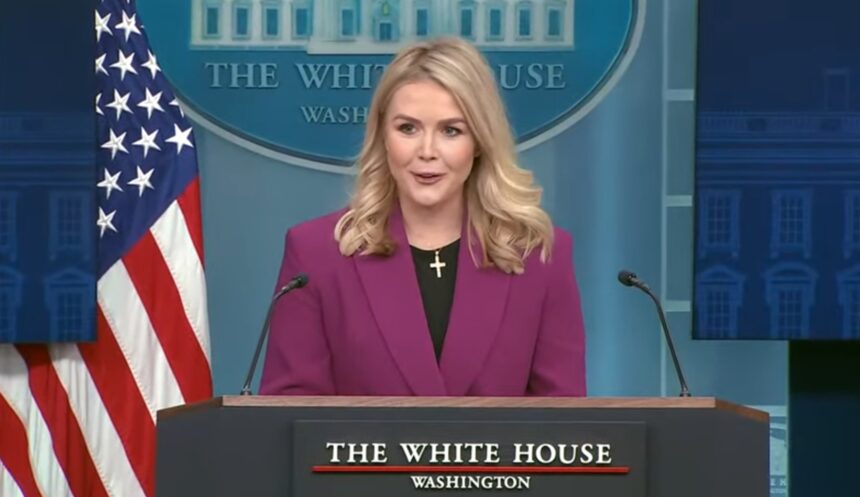At just 27 years old, Karoline Leavitt has made history as the youngest White House press secretary in U.S. history. With her appointment under President Donald Trump’s second term, she steps into one of the most high-profile roles in the administration. A New Hampshire native and a graduate of Saint Anselm College, Leavitt has quickly risen through the ranks in conservative politics, making a name for herself as a strong communicator and media strategist. Her journey from being a college intern to the face of White House communications reflects a new era in political messaging and media engagement.
Leavitt’s appointment signals a strategic shift in how the Trump administration plans to interact with the press and public. With her background in both traditional media and digital platforms, she is expected to bring a more modern, diversified approach to White House communications. From her early career as a Fox News intern to working as an assistant press secretary in Trump’s first term, Leavitt has built a reputation for loyalty and efficiency. Her most recent role as national press secretary for Trump’s 2024 campaign showcased her ability to manage large-scale media narratives and counter attacks from opposition and mainstream media outlets.
Stepping into the White House briefing room for the first time as press secretary, Karoline Leavitt made an immediate impact. She outlined her vision for enhanced media engagement, stating that the administration would take a more inclusive approach to news coverage, allowing a broader range of voices into the briefing room. One of the most significant changes she announced was the introduction of a “new media” seat, specifically for podcasters, influencers, and independent journalists.
This move reflects a growing shift in how Americans consume news. With trust in mainstream media at an all-time low, many Americans turn to alternative sources like social media platforms, podcasts, and independent news outlets. Leavitt’s decision to introduce a rotating press seat for non-traditional journalists aims to break the monopoly of legacy media and give a voice to diverse perspectives, including conservative outlets that have often been marginalized.
Leavitt’s first briefing covered key policy updates, including the administration’s freeze on federal grants and efforts to expedite deportations. She also addressed concerns regarding the temporary suspension of Medicaid funds, assuring the public that the administration is working towards a swift resolution. One of the more unusual questions she fielded related to recent drone sightings over New Jersey, to which she responded that they were authorized by the FAA for recreational purposes.
Unlike previous press secretaries who often sparred with the media, Karoline Leavitt has emphasized a more proactive and engaging approach. She acknowledged the importance of digital media, stating that the administration would increase its presence on social platforms like Twitter, YouTube, and TikTok to communicate directly with the American people. This move aligns with Trump’s media strategy, which has always been heavily focused on social media outreach.
Leavitt also addressed concerns about media bias, stating that the administration would be holding journalists accountable for misinformation. She pointed out that many traditional news outlets have lost credibility due to partisan reporting, and she vowed to ensure that conservative voices are given equal representation. Furthermore, she announced that the White House would be restoring press passes for journalists whose credentials were revoked under the Biden administration, a move aimed at rebuilding trust with the press.
Her calm demeanor and well-structured responses during her first press briefing were widely noted. Unlike some of her predecessors who engaged in contentious exchanges with reporters, Leavitt maintained composure and stuck to clear, concise messaging. Her performance highlighted the administration’s more disciplined media strategy, signaling that Trump’s second term aims to be more structured and less chaotic than his first.
Karoline Leavitt’s rise to prominence is a testament to her determination and political acumen. She began her career as an intern at Fox News, later joining the Trump administration in 2019 as an assistant press secretary. In 2022, she made headlines when she ran for Congress in New Hampshire’s 1st Congressional District, though she ultimately lost the race. Despite this setback, she remained a key figure in conservative politics, later joining Rep. Elise Stefanik’s office as communications director.
Leavitt’s work during Trump’s 2024 re-election campaign played a crucial role in shaping the administration’s messaging strategy. As the campaign’s national press secretary, she was responsible for handling press relations, media appearances, and social media outreach. Her aggressive yet composed style made her a formidable spokesperson, helping to counter mainstream media narratives and promote Trump’s policies effectively.
Beyond politics, Karoline Leavitt is also a devoted family woman. She is engaged to Nicholas Riccio, and they welcomed their son, Nicholas Jr., in July 2024. Despite the challenges of balancing motherhood and a high-pressure political role, Leavitt has remained dedicated to her career, returning to work shortly after giving birth. She has stated that her motivation to serve in the administration stems from a belief that the country is at a critical turning point and that she wants to be part of restoring conservative values in America.
Her ability to juggle personal responsibilities and a demanding political career has made her an inspiration to young conservatives, especially women looking to make an impact in politics. Leavitt’s rapid ascent within the Republican Party demonstrates that hard work, loyalty, and strategic thinking can pave the way for success in Washington.
As press secretary, Karoline Leavitt faces numerous challenges. She must navigate a hostile press corps, counter negative narratives about the administration, and maintain public trust in the White House’s messaging. The political climate remains deeply polarized, and her role requires constant vigilance to ensure that the administration’s policies are communicated effectively.
One of the key tests of her tenure will be how she handles major crises and controversies. Every White House press secretary must be prepared to face intense scrutiny, especially in an era where misinformation spreads rapidly. With her strong media background and ability to stay on message, Leavitt appears well-equipped to take on these challenges.
Karoline Leavitt’s appointment represents a new chapter in White House communications. By incorporating social media influencers, podcasters, and independent journalists into the press corps, she is redefining how information is disseminated to the public. Her focus on transparency and accountability could help restore trust in government communications, particularly among conservative audiences who feel alienated by mainstream media.
Her role in shaping the Trump administration’s public relations strategy will be closely watched in the coming months. Whether she succeeds in bridging the gap between traditional and new media remains to be seen, but one thing is clear: Karoline Leavitt is here to make an impact.
Karoline Leavitt’s appointment as White House press secretary is a bold move by the Trump administration, reflecting a shift towards a more structured and modern media strategy. As the youngest person to ever hold this role, she brings energy, expertise, and a fresh approach to White House communications. With a strong background in media relations, a commitment to conservative values, and an innovative approach to press engagement, she is poised to reshape the way the administration interacts with the public.
Whether you agree with her politics or not, one thing is undeniable—Karoline Leavitt is a rising star in American politics, and her tenure as press secretary will be one to watch closely. Stay tuned, because this is just the beginning of her journey.






